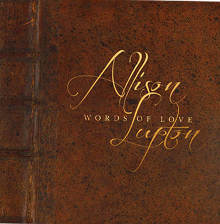The Graham Album Review #1998

Click on CD Cover for Audio Review in streaming mp3 format | |
by George Graham
(Independent Release as broadcast on WVIA-FM 9/18/2019)

Click on CD Cover for Audio Review in streaming mp3 format | |
by George Graham
(Independent Release as broadcast on WVIA-FM 9/18/2019)
Canadian folk artists have a long history on the music scene, going back to Gordon Lightfoot, along with Joni Mitchell and Neil Young. In recent years, the scene has been as diverse as it is south of the border, with artists ranging from contemporary singer-songwriters to more traditional folksingers to artists who combine influences from both sides of the Atlantic, drawing on sounds from Celtic to French. This week we have an excellent new album by an artist who combines several of those aspects, Allison Lupton, whose new release, her third, is called Words of Love.
Allison Lupton was raised on a dairy farm in rural Ontario, and was surrounded by music in her family growing up. She was attracted to the Canadian folk scene, but then became become interested in and immersed herself in Irish and Celtic music, which was influential to the folk music of various regions in Canada, including the Maritimes. She performed as a member of bands, including one called Killiecrankie, then released her first album under her own name in 2001.
The new release includes some fine backing musicians, including mandolin player Andrew Collins, guitarist Tony McManus, bassist Joseph Phillips and fiddler Shane Cook. Ms. Lupton plays Irish flute and pennywhistle.
The songs on Words Of Love sound traditional, and there is some traditional material, but most of the album consists of original compositions by Ms. Lupton. Lyrically, she has drawn on some of her family ancestors’ experience, including a migration from the British Isles to Canada. Stylistically, the album goes back and forth between Celtic influence with her pennywhistle, and bluegrass featuring a Dobro. Ms. Lupton’s vocals are just right for the traditional sounding material. She can resemble some contemporary Irish singers like Karan Casey.
Opening is one of the more memorable songs on the album, Away, which tells the story of children of impoverished families from England who were sent to Canada to work in the fields in the early 20th Century in search of a better life. Though once in Canada, some were abused or overworked. Ms. Lupton had a great-uncle who was one of those child emigrants. The song shows the Celtic side of the album with the piece being in the form of a jig, with very tasteful playing by the band. <<>>
The bluegrass facet of the album is highlighted on What Will I Dream. The song was written for a compilation of Canadian artists, reflecting on the country. <<>>
Another song drawing on the Celtic influence is a traditional piece called When I First Went to Caledonia. The Caledonia in question is a mine on Cape Breton Island in Nova Scotia, and refers to the laborers there who went there to make some money to send home. <<>>
The title song Words of Love is an original piece by Ms. Lupton, inspired by a trip to England, and staying in an old former church in which an old love letter was found. Again, the group shifts to bluegrass. <<>>
Another of the traditional songs is Lost Jimmy Whelan, a piece from Canada, though it’s based on British Isles ballads, including The Unquiet Grave, one of those tragic tales of a lover joining her fallen beau in death. <<>>
The album features two instrumentals. One is called The Ontario Tune Set, a pretty medley of Celtic influenced tunes, with Ms. Lupton’s flute and pennywhistle prominent. <<>>
Another highlight of the album is Poverty Knock based on a traditional song about the hardships of workers in the mills of Northern England. The group’s acoustic arrangement is outstanding. <<>>
I Will Rise is the most lyrically uplifting song on the album. With a bluegrass influenced arrangement, the original song is inspired, according to Ms. Lupton, by “the strength and courage of our loved ones.”
Words of Love the new album by Canadian singer-songwriter and flute player Allison Lupton is an outstanding acoustic recording that reflects the different aspects of the Canadian scene, influenced in turns by Irish and Celtic music, and bluegrass. The players are outstanding, and Ms. Lupton’s vocals are very appealing. It’s one of those albums with original music that sounds a century or more old. It’s intermixed with some genuinely traditional music, but the group gives a fresh musical spin to those old folk songs.
Our grade for sound quality is close to an “A.” The acoustic instruments have a warm, open sound, and Ms. Lupton’s vocals are similarly well-treated. I might have used a little less reverb in places, but overall, the album is well-recorded and rewards listening to it on a good sound system.
Allison Lupton provides another nice reminder of the richness of the Canadian folk scene, through this gem of an album.
(c) Copyright 2019 George D. Graham. All rights reserved.
This review may not be copied to another Web site without written permission.
 To Index of Album Reviews | To George Graham's Home Page. | What's New on This Site.
To Index of Album Reviews | To George Graham's Home Page. | What's New on This Site.